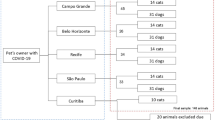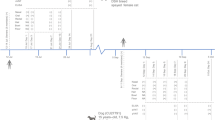Abstract
The global presence of SARS-CoV-2 in household pets is acknowledged, yet documentation remains scarce, leaving many regions unexplored. Thus, our study sought to fill this gap by investigating SARS-CoV-2 presence in dogs visiting veterinary clinics during the third pandemic peak in eastern Colombia. We collected and analyzed 43 oropharyngeal and rectal swabs using real-time PCR assays targeting the Envelope Gene of SARS-CoV-2. Out of these, two dogs tested positive, indicating an infection rate of 4.7%. Further examination through complete sequencing and phylogenetic analysis revealed the lineage B.1.621 for the SARS-CoV-2 genome. Consequently, our study unveils the first documented cases of Canis lupus familiaris infected with the Mu variant of SARS‐CoV‐2, the variant with the most death burden during the whole pandemic in Colombia. Remarkably, these cases presented mild and reversible respiratory and gastrointestinal symptoms, or no clinical manifestations at all. This sheds light on the virus's interaction with our four-legged companions, offering valuable insights into its transmission dynamics and potential effects on animal health.

Similar content being viewed by others
Data availability
No datasets were generated or analysed during the current study.
References
Alberto-Orlando S, Calderon JL, Leon-Sosa A et al (2022) SARS-CoV-2 transmission from infected owner to household dogs and cats is associated with food sharing. Int J Infect Dis 122:295–299. https://doi.org/10.1016/j.ijid.2022.05.049
Botero Y, Ramírez JD, Serrano-Coll H et al (2022) First report and genome sequencing of SARS-CoV-2 in a cat (Felis catus) in Colombia. Mem Inst Oswaldo Cruz 117:e210375. https://doi.org/10.1590/0074-02760210375
Cabrera A, González-Álvarez D, Gutiérrez LA et al (2022) Natural SARS-CoV- 2 infection in domestic cats and dogs of humans diagnosed with COVID-19 in Valle de Aburrá, Antioquia. Biomedica 42:48–58. https://doi.org/10.7705/biomedica.6407
Corman VM, Landt O, Kaiser M et al (2020) Detection of 2019 novel coronavirus (2019-nCoV) by real-time RT-PCR. Euro Surveill 25:2000045. https://doi.org/10.2807/1560-7917.ES.2020.25.3.2000045
de Morais HA, dos Santos AP, do Nascimento NC, Kmetiuk LB, Barbosa DS et al (2020) Natural infection by SARS-CoV-2 in companion animals: a review of case reports and current evidence of their role in the epidemiology of COVID-19. Front Vet Sci 27
Decaro N, Balboni A, Berolotti L, Martino PA, Mazzei M et al (2021) SARS-CoV-2 infection in dogs and cats: facts and speculations. Front Vet Sci 10
GISAID (2024) GISAID Initiative
Gonzalez-Reiche AS, Alshammary H, Schaefer S et al (2023) Sequential intrahost evolution and onward transmission of SARS-CoV-2 variants. Nat Commun 14:3235. https://doi.org/10.1038/s41467-023-38867-x
Jimenez-Silva C, Rivero R, Douglas J et al (2023) Genomic epidemiology of SARS-CoV-2 variants during the first two years of the pandemic in Colombia. Commun Med 3:97. https://doi.org/10.1038/s43856-023-00328-3
Liew AY, Carpenter A, Moore TA et al (2023) Clinical and epidemiologic features of SARS-CoV-2 in dogs and cats compiled through national surveillance in the United States. J Am Vet Med Assoc 261:480–489. https://doi.org/10.2460/javma.22.08.0375
Pourbagher-Shahri AM, Mohammadi G, Ghazavi H, Forouzanfar F (2023) Susceptibility of domestic and companion animals to SARS-CoV-2: a comprehensive review. Trop Anim Health Prod 55:60. https://doi.org/10.1007/s11250-023-03470-1
Rivero R, Garay E, Botero Y et al (2022) Human-to-dog transmission of SARS-CoV-2, Colombia. Sci Rep 12:7880. https://doi.org/10.1038/s41598-022-11847-9
Sirakov I, Bakalov D, Popoya R, Mitov I (2020) Analysis of host cell receptor GRP78 for potential natural reservoirs of SARS-CoV-2. J Epidemiol Glob Health 10:198–200
Sirakov I, Popova-Ilinkina R, Ivanova D, Rusenova N, Mladenov H, Mihova K, Mitov I (2022) Development of nested PCR for SARS-CoV-2 detection and its application for diagnosis of active infection in cats. Vet Sci 9:272. https://doi.org/10.3390/vetsci9060272
WHO (2024) World Health Organization (WHO). WHO COVID-19 dashboard
WOHA (2024) SARS CoV-2 in Animals – Situation Report 20
Zamorano-Cuervo N, Grandvaux N (2020) ACE2: Evidence of role as entry receptor for SARS-CoV-2 and implications in comorbidities. eLife 9:e61390
Zhou J, Peacock TP, Brown JC et al (2022) Mutations that adapt SARS-CoV-2 to mink or ferret do not increase fitness in the human airway. Cell Rep 38:110344. https://doi.org/10.1016/j.celrep.2022.110344
Acknowledgements
The authors would like to express their gratitude to veterinary clinics (Fauna, Hemalav, Vet Center, Los perritos, Centro Médico Veterinario and Vetermédicas), for agreeing to participate in the study. Likewise, to all the pet owners who also voluntarily decided to take part in the work.
Funding
This work was supported by Universidad de Santander, Grant numbers (CIF-1621) and Universidad del Rosario.
Author information
Authors and Affiliations
Contributions
All authors contributed to the study conception and design. Material preparation: CMSR, JCP, NB, CH. Data collection and analysis were performed by CMSR, JP, MM, NB, CH and JDR. The first draft of the manuscript was written by [CMSR, MM and NB] and all authors commented on previous versions of the manuscript. All authors read and approved the final manuscript.
Corresponding author
Ethics declarations
Ethical approval
This research project was approved by the Ethics Committee of the University of Santander according to number 029 (17-12-2020) and provided the permit from ANLA (Autoridad Nacional de Licencias Ambientales) for sampling (1749).
Competing interests
The authors declare no competing interests.
Additional information
Publisher's Note
Springer Nature remains neutral with regard to jurisdictional claims in published maps and institutional affiliations.
Rights and permissions
Springer Nature or its licensor (e.g. a society or other partner) holds exclusive rights to this article under a publishing agreement with the author(s) or other rightsholder(s); author self-archiving of the accepted manuscript version of this article is solely governed by the terms of such publishing agreement and applicable law.
About this article
Cite this article
Sandoval-Ramírez, C.M., Ballesteros, N., Pinilla, J.C. et al. SARS-CoV-2 Mu variant in dogs visiting veterinary clinics during the third pandemic peak in Eastern Colombia. Vet Res Commun (2024). https://doi.org/10.1007/s11259-024-10374-4
Received:
Accepted:
Published:
DOI: https://doi.org/10.1007/s11259-024-10374-4




